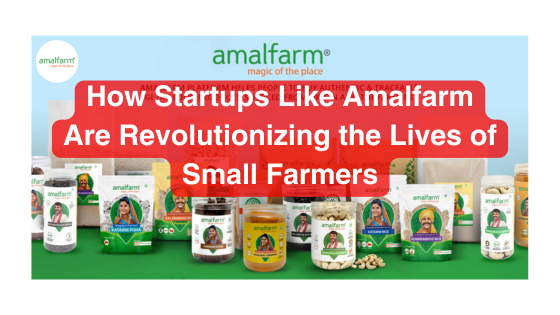
How Startups Like Amalfarm Are Revolutionizing the Lives of Small Farmers
amalfarm2025-01-03T15:47:24+00:00
Imagine this scenario: small farmers have gotten the fairness and assistance they deserve, their fields are flourishing, and their customs are upheld alongside. This is not merely a mere fantasy anymore – startups are making that possible. New ideas with a new perspective, those businesses transform the outlook of agricultural practices.
We will also analyze in this blog how small farmers are benefitted from the services of start-ups in general and further discuss about how startups like Amalfarm is making magic happen! So Amalfarm works with small farmers, and promotes them, aims to make fair trade, works on sustainable practices, these settlements allow farmers to look forward to a brighter future without letting go of their roots. Come let us delve deeper!
The Barriers Encountered by Small Farmers

Small farmers face a stiff hard terrain in today’s agriculture. One of the biggest ones that they come across is ‘lack of market access’ which in-turn results in dealing with middlemen. With middlemen employed it mostly results in low income and unfair compensation for the value they created through labor.
Agriculturalists face a parallel problem of technological gaps. With being unequipped with tools and equipment, ready to use technologies, they cannot incorporate even tough cultivation methods. All of the above mentioned puts them at a huge deficit in a world that is famished with technologies.
And perhaps the only other blue is, or maybe the only other constant blue remained is ‘income instability’. Farmers have to depend upon seasonal crop yields along with the variances in the market price.
Startups in Agriculture Sector: A Paradigm Shift

New startups in the agricultural sector have reinvented the space by integrating technology with long-held traditional methodologies. Trying to combine the old with the new, these start up are in the revolution of modernizing farming to increase efficiency.
There is an increase in the quantity of these new start-up companies due to the fact that there is a strong stress on eco-friendly start up companies that advocate green farming. Such modifications not only assist in sustaining the health of the soil and the quality of crops but also increase the demand for these fresh fruits and vegetables among consumers.
Additionally, farmers benefit from international customers on one-click e-commerce sites. New companies are allowing small farms to interact with their global consumers, which expands the possibilities of small companies that were previously unknown.
How Amalfarm Is Creating An Impact

Amalfarm is innovating in agriculture by creating modern farmers and upholding the customs. The firm collaborates with regional farmer associations, avoiding middlemen in order to give farmers the benefits they ought to have. By promoting altering farming methods, Amalfarm encourages farmers to further enhance their productivity and the quality of their crops while also preserving the ecological balance.
One of the major Amalfarm’s missions is nurturing culture. We not only promote farmers but also promote and maintain cultural and historical aspects through the marketing of kalanamak rice which is a geographically endorsed product. It is a novel method that allows consumers to understand the background behind the food they are consuming.
The other principal approach of Amalfarm is fair prices to the farmers, which allows them to sell their products at competitive market rates. This in turn helps the company provide food security to the farmers as well as the farming communities.
Last but not least, startups like Amalfarm puts emphasis on spreading confidence. They deal with real unprocessed, and preservative-free wonderful products. Through this, Amalfarm finds the small-sized farmers and the worldwide suitors of such realities, and every side sees the advantages of sustainable and honest agriculture as high quality.
Conclusion

Startups like Amalfarm are transforming the lives of small farmers by combining innovation with tradition. By offering fair trade opportunities, promoting sustainable farming, and preserving regional heritage, they empower farmers to thrive in an ever-changing world. These efforts not only uplift farming communities but also provide consumers with authentic, high-quality products they can trust. As the agriculture sector continues to evolve, the role of startups in bridging the gap between farmers and global markets becomes increasingly crucial. Supporting such initiatives is more than just a choice—it’s a step toward creating a sustainable and inclusive future for agriculture.
